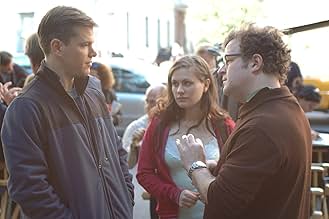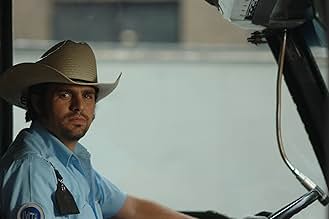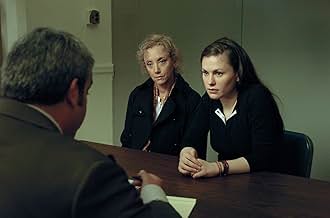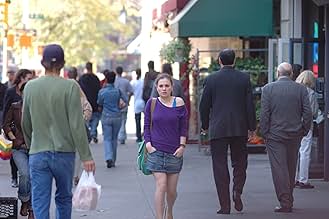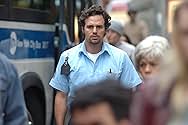AVALIAÇÃO DA IMDb
6,5/10
19 mil
SUA AVALIAÇÃO
Uma jovem testemunha um acidente de ônibus e é pega no rescaldo, onde a questão de saber se foi ou não intencional afeta a vida de muitas pessoas.Uma jovem testemunha um acidente de ônibus e é pega no rescaldo, onde a questão de saber se foi ou não intencional afeta a vida de muitas pessoas.Uma jovem testemunha um acidente de ônibus e é pega no rescaldo, onde a questão de saber se foi ou não intencional afeta a vida de muitas pessoas.
- Prêmios
- 10 vitórias e 18 indicações no total
Avaliações em destaque
Margaret – CATCH IT (B+) Margaret is very interesting movie about a teenage girl partially involved in woman death in a brutal accident. The movie deals with how she is wants the bus driver to at least accept his mistake too and have some remorse or gilt. The movie takes to her journey how she tries to deal with her conscious. She is now torn apart with frustration and begins to emotionally brutalizing her family, her friends, her teachers, and most of all, herself. Anna Paquin's performance as Margaret is terrific. She literally lived the role. From start to finish you won't be able to take your eyes off her, she may now always be remembered as Sookie Stackhouse but here she shows how incredible emotional range she has as an artist. Alison Janney is her death sequence was amazing. It maybe was a 5mintse scene but she sold her death to us and we can now imagine why Lisa was so heartbroken because of her death. J.Smith-Cameron is superb as Lisa's mom. Mark Ruffalo, Matt Damon, John Gallager JR, Kieran Culkin, Rosemarie DeWitt, Jene Rene and Matthew Broderick did a decent job in their respective small yet pivotal roles. In the end Margaret is a nice movie and only flaw it has is its incredibly long without any reason. The movie could have been easily cut into hour and half by eliminating extra scenes or views of New York City.
Margaret is a well written coming of age drama, but the protagonist is not a sympathetic character, which is going to alienate a lot of the audience right off the bat. The girl behind me as I left the theater didn't like it, telling her friend, "I just couldn't stand Anna Paquin's character." The screenplay is deft at shorthanding idiosyncratic, complicated personalities with naturalistic dialogue. It also helps that every role in the film, including almost every minor part, is cast with a top notch actor. But for all the big Hollywood names, my props go to J. Smith-Cameron for a theater-grade performance scaled down to fit the intimacy of a close up shot. The movie explores the milieu of affluent teenagers attending an upscale school in New York City, and one of the other reviewers here is right in saying it resembles a French film in that it takes an mature approach to depicting adolescents, showing them as smart, complicated, sexual, uncertain. Most mainstream reviewers seem puzzled as to what they should think about it. I think it's over their heads, the elliptical, dialogue heavy, character driven narrative style, as well as the lack of an easy, simple take-away moral, seems to have befuddled them. Maybe we should rope in some theater critics' opinions instead.
This is the Theatrical Cut...What to say of the film? I definitely enjoyed it at times, and it had some powerful scenes and acting. Paquin in particular has some very impressive moments, and the characters here are all interesting. It's hard to really grasp the characterization at times, and the melodramatic moods that go along with the different plot lines make for a very interesting, very unique, spin. The film is never flat out dull, and there's always a hint of genius behind it all, but ultimately it feels like a structurally messy composition of story lines. It's a very odd, inconsistent film, and even Paquin's portrayal and character is hard to wrap your finger around. Like I said, there are moments of brilliance, but also scenes that I didn't care for at all and scenes that left me feeling nothing other than confusion as to why they were there. I get the impression that the writer/director is really trying something here, and sometimes it felt like he succeeded, but as a film there's one too many flaws. The editing is rather distracting, and while it worked at times there's no reason why it shouldn't have been much better in certain moments. Scenes come and go without any particular flow, and it really hurts the film.
Ultimately, this is a frustrating, uneven, incohesive film with inconsistent characters and a pretty great, but again inconsistent, main performance by Anna Paquin. Don't be fooled, there are great moments sprinkled in here, and Lisa's classroom scenes really resonate, but it's just not enough to recommend. I wish I actually wanted to seek out the Extended Cut, but I really don't. I know many people will read this and say I "didn't get it" and that's fine since it works both ways for all film buffs, but I'm not a fan, and the more I think about it the less I like it. At least it's not boring.
Ultimately, this is a frustrating, uneven, incohesive film with inconsistent characters and a pretty great, but again inconsistent, main performance by Anna Paquin. Don't be fooled, there are great moments sprinkled in here, and Lisa's classroom scenes really resonate, but it's just not enough to recommend. I wish I actually wanted to seek out the Extended Cut, but I really don't. I know many people will read this and say I "didn't get it" and that's fine since it works both ways for all film buffs, but I'm not a fan, and the more I think about it the less I like it. At least it's not boring.
On the day of its cinema release, Kenneth Lonergan's long-gestating drama was the most successful film in the UK. Problem was, it only opened on one screen. The story of Margaret's production is likely a fascinating story in itself, not least because of Martin Scorsese and Thelma Schoonmaker's input into the final edit, which was presumably a return favour for Lonergan's work on the screenplay for Gangs of New York. But I'll focus on the fascinating story that Lonergan has told with this film.
Ostensibly the tale centres on a New York schoolgirl named Lisa (Anna Paquin, defining her young adulthood just as she defined herself in childhood with The Piano), who inadvertently causes a fatal road accident. What follows is the emotional aftermath, fought outwardly with her mother, as a moral and ethical war wages within her hormone-ravaged body.
The performances are excellent throughout, particularly Paquin and J. Smith-Cameron as the daughter and mother caught in gravitational flux. Jean Reno gives fine support as the sad-sack Ramon, while Matthew Broderick delivers the poem (by Gerard Manley Hopkins) that provides the film's title, while suggesting the entire life of his character by the way he eats a sandwich. It's that kind of film.
I recently wrote a review of Winter's Bone, which I described as an anti-youth movie. Margaret could be a companion piece in this regard, cautioning against the bright-eyed naivety of youthful independence, and promoting the importance of family. Like Winter's Ree, Lisa is a lost soul; unlike Ree, Lisa is not someone we admire. But she is always in focus; Lonergan expects not for us to like her, only to understand her. In maintaining this focus, Lonergan himself achieves the admirable: weaving a narrative whose minute details and labyrinthine arguments mirror the broader existential vista against which they are dwarfed.
Margaret goes deeper than Winter's Bone, delivering something pleasingly unexpected: a kind of Sartrean modern fable about the isolating nature of subjectivity. Like her actor mother on the stage, and like us all in our semi-waking lives, Lisa is the main player in her great opera. She performs the social functions that enable her to cling to a sense of belongingness, but something gnaws at her soul. And when, after the accident, she seeks some kind of meaning, she is met at once by indifference, before being seduced by those very institutions that make indifference normal. Nothing in the material world satisfies Lisa; nothing can match her aspirations. The suggestion here, I feel, is that our despair emerges from the disparity between that which we hope for and that which reality can deliver.
No wonder it took so long to find its way to a single UK screen: a three-hour existentialist play is a tough sell. Ten years after the towers sank to Ground Zero, Margaret joins There Will Be Blood, The Assassination of Richard Nixon, and (for some) Zodiac in the pantheon of modern classics that map the American psyche in the post-9/11 world.
Ostensibly the tale centres on a New York schoolgirl named Lisa (Anna Paquin, defining her young adulthood just as she defined herself in childhood with The Piano), who inadvertently causes a fatal road accident. What follows is the emotional aftermath, fought outwardly with her mother, as a moral and ethical war wages within her hormone-ravaged body.
The performances are excellent throughout, particularly Paquin and J. Smith-Cameron as the daughter and mother caught in gravitational flux. Jean Reno gives fine support as the sad-sack Ramon, while Matthew Broderick delivers the poem (by Gerard Manley Hopkins) that provides the film's title, while suggesting the entire life of his character by the way he eats a sandwich. It's that kind of film.
I recently wrote a review of Winter's Bone, which I described as an anti-youth movie. Margaret could be a companion piece in this regard, cautioning against the bright-eyed naivety of youthful independence, and promoting the importance of family. Like Winter's Ree, Lisa is a lost soul; unlike Ree, Lisa is not someone we admire. But she is always in focus; Lonergan expects not for us to like her, only to understand her. In maintaining this focus, Lonergan himself achieves the admirable: weaving a narrative whose minute details and labyrinthine arguments mirror the broader existential vista against which they are dwarfed.
Margaret goes deeper than Winter's Bone, delivering something pleasingly unexpected: a kind of Sartrean modern fable about the isolating nature of subjectivity. Like her actor mother on the stage, and like us all in our semi-waking lives, Lisa is the main player in her great opera. She performs the social functions that enable her to cling to a sense of belongingness, but something gnaws at her soul. And when, after the accident, she seeks some kind of meaning, she is met at once by indifference, before being seduced by those very institutions that make indifference normal. Nothing in the material world satisfies Lisa; nothing can match her aspirations. The suggestion here, I feel, is that our despair emerges from the disparity between that which we hope for and that which reality can deliver.
No wonder it took so long to find its way to a single UK screen: a three-hour existentialist play is a tough sell. Ten years after the towers sank to Ground Zero, Margaret joins There Will Be Blood, The Assassination of Richard Nixon, and (for some) Zodiac in the pantheon of modern classics that map the American psyche in the post-9/11 world.
Shot back in 2005, after a long history of editing problems, this film finally got released in 2011, and debuted on DVD in 2012, with an extended director's cut (I guess) included. Unfortunately, I accidentally watched the shorter (still two and a half hour) version. I'm not sure I'd want to sit through another half hour of this. It's a good film, at its heart. The story is very good, anyway. My big problem with it is that the central character, played by Anna Paquin, is such an unlikeable, pretentious little snot I eventually just stopped caring about what was going on. It's a totally realistic depiction of a teenager, but it reminds me how much I hate teenagers, or at least teenagers like her. Frankly, most of the rest of the characters are equally as obnoxious. I was extremely glad to see Jeannie Berlin call Paquin out on her bullcrap, but she's just as detestable. I found it hilarious that Paquin mistakenly calls her "strident," which she thinks means "pig-headed" or something but which actually means "shrill." The whole film is honestly pretty shrill. The story revolves around Paquin causing a bus accident. At first, she lies about it, then later she feels bad about it and tries to recant her statement.
Você sabia?
- CuriosidadesOriginally scheduled for release in 2007, but writer/director Kenneth Lonergan spent four more years struggling with Fox Searchlight Pictures over the final cut, resulting in several lawsuits.
- Erros de gravaçãoWhen Lisa comes home after the accident, throws up and hugs her mother, there's no blood on her arms and hands. In the next shots under the shower, there is plenty.
- Versões alternativasExtended version released on DVD runs for 178 minutes.
- ConexõesFeatured in Maltin on Movies: Ice Age: Continental Drift (2012)
Principais escolhas
Faça login para avaliar e ver a lista de recomendações personalizadas
Detalhes
Bilheteria
- Orçamento
- US$ 14.000.000 (estimativa)
- Faturamento bruto nos EUA e Canadá
- US$ 46.495
- Fim de semana de estreia nos EUA e Canadá
- US$ 7.525
- 2 de out. de 2011
- Faturamento bruto mundial
- US$ 469.264
- Tempo de duração
- 2 h 30 min(150 min)
- Cor
- Mixagem de som
- Proporção
- 1.85 : 1
Contribua para esta página
Sugerir uma alteração ou adicionar conteúdo ausente




